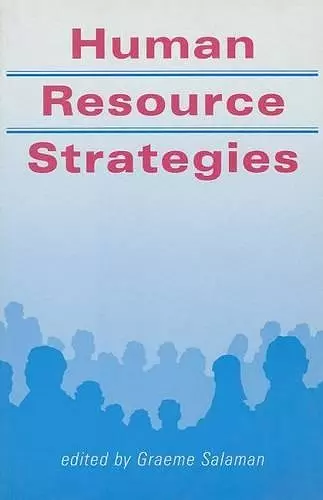Human Resource Strategies
Format:Paperback
Publisher:Sage Publications Ltd
Published:31st Dec '91
Currently unavailable, and unfortunately no date known when it will be back
This paperback is available in another edition too:
- Hardback£185.00(9780803986268)

Few would disagree with the principle that successful achievement of an organization′s overall strategic objectives is bound up with the design and implementation of appropriate human resource strategies (HRS). Yet many questions remain about what is entailed in implementing effective HRS. This volume brings together a range of outstanding contributions which explore not only the advantages but also the complexities of a strategic approach to human resource management. Deliberately broad in scope to reflect the organization-wide ramifications of HRS, combining theoretical analyses alongside case studies of HRS in practice, the book offers a fascinating review of this crucial topic.
The book begins by addressing key themes and debates within the field about the nature and role of human resource management. Succeeding sections then focus on three core organizational arenas inevitably implicated in strategic human resource management - organizational structure, culture and personnel strategies.
Human Resource Strategies is a Course Reader for the Open University Course B884 Human Resource Strategies.
`Both theoretical and practical examination of the issues makes for a fascinating review of the field′ - Journal of the Institute of Health Education
`Like most OU Course Readers it is sturdy enough to stand on its own, and I am sure that it will prove to be of value to researchers and practitioners as well as to students following Masters′ courses in management.... There is a good balance between the conceptual (Clegg on modernist and post-modernist organization), the analytical (McKinlay and Starkey′s case studies of Pilkington′s, Rank Xerox and Ford UK) and the practical (Seegers′ description of the use of assessment centres in the selection and promotion of employees). The editors have produced more than a mere collection of articles: they have brought together an up-to-date, varied and representative sequence of contributions, linked together by brief and thoughtful introductions to each section.... the variety of perspectives ensures that the Reader as a whole is not overly promotional of one point of view. Its use as a reference text is helped by a good subject index.... There is, though, a great deal to recommend. For me, the high spots are: the clarity of Storey′s application of human resource management to the public sector (chapter 4), and his four-part conceptual framework built, as he says, on the pillars of integration, commitment and responsiveness, individualism, and line-manager ownership; Drucker′s vision (chapter 9) of the information-based organization of the future, more like a hospital, university or symphony orchestra than the large business of today, and his prediction that once we realize that `whole layers of management neither make decisions nor lead′ the new organizations will become predominantly organizations of knowledge-specialists and professionals; the impishness of Keep′s suggestion (in a chapter on corporate training for strategies that should be required reading for all those involved in industrial training) that managers might not universally and unequivocally seek out well-trained employees - `bearing in mind the education and training of British managers, it is open to question how genuine would be their welcome for a better-educated, better-trained, more self-sufficient and questioning workforce′.... In general, the contributions should promote serious reflection on many of the human resource issues facing managers in the UK today, and perhaps to help remedy what Guest identifies as `their failure to develop habits of reading and of keeping up to date with new ideas′. Although the principal readership will be found in the world of business, every chapter has something of importance to say to the public sector manager, and this volume should be read by senior staff both in the soon-to-be incorporated FE colleges and... in the newly-designated Universities′ - Tony Lewis, University of Greenwich, in The Vocational Aspect of Education
`A very useful reader.... It combines readability with utility, as well as using pieces which are appropriate for a British readership, as opposed to most books on HRM which seem to be biased towards the US market.... This volume commendably tries to approach HRM from the standpoint of `organization theory′ and in doing so focuses on strategies and structures in ways that are both insightful and interesting′ -Journal of General Management
`Those who are interested in the development and in an actual state of the art of HRM in the US, can gain insight from Beaumont′s brilliant and critical review of the American HRM literature. Argyris′s hypothesis on the skilled incompetence of managers is highly noteworthy.... Buchanan′s study on the acceptability in worker control is an interesting contribution to the phenomenon of individualization - a topic which has been discussed for some years now in Germany. Clegg′s study on modernist and postmodernist organization is worth reading for its comparison of Japanese and western styles of management.... Among the three contributions on corporate culture in Part Three Meek′s contribution remains remarkable because it treats organizational culture not as a variable which can be determined and measured but as an integrative part of organizations. Schein′s famous essay on the awareness of organizational culture has meanwhile become a classic′ -Management International Review
ISBN: 9780803986275
Dimensions: unknown
Weight: 600g
360 pages